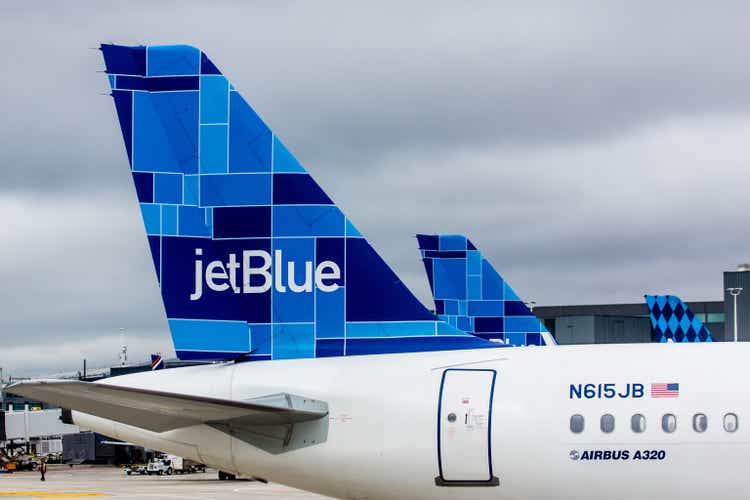
rypson/iStock Editorial via Getty Images
In a surprise move, JetBlue Airways (JBLU) submitted an unsolicited proposal to acquire Spirit Airlines (NYSE:SAVE). The deal price is higher than a previous offer from Frontier Group Holdings (ULCC), but the deal offer isn’t necessarily a “superior proposal”. My investment thesis remains Bullish on Spirit Airlines, regardless of which deal proceeds to conclusion.
JetBlue Offer
JetBlue has submitted an all-cash offer to acquire Spirit Airlines for $3.6 billion, or ~$33 per share, in cash. Spirit Airlines was trading at only $22 prior to this deal proposal being leaked by the New York Times offering shareholders a 50% premium.
A big difference in the deals for shareholders is that the Frontier Airlines proposal is $23 per share in mostly stock. The deal has a small cash portion of $2.13 per share.
Under the Frontier merger, a Spirit Airlines shareholder could roll their shares into the combined stock in a tax-free transaction. The shareholder would participate in the potential upside of the combined airline focused on the growth of ultra, low-cost carrier segment.
JetBlue is more focused on the premium discount market. While the business combination wouldn’t appear to fit with Spirit Airlines, this isn’t really a concern for current shareholders. The proposal is expected to deliver at least $600 million in operational synergies, again only beneficial to existing JetBlue shareholders as a Spirit Airlines shareholder will obtain cash.
To terminate the Frontier deal, Spirit Airlines would have to pay a $94.2 million breakup fee per the 8-K filing.

Source: Spirit Airlines 8-K
Complex Decision
The JetBlue deal has some interest because the valuation is based on current prices whereas the Frontier deal has lost value. Frontier originally offered $25.83 per share. Spirit shareholders will obtain 1.9126 shares in Frontier stock with the cash portion at $2.13.
With Frontier falling below $11.50 prior to the rally, the deal value had dipped to only $24.12 providing shareholders technically with a ~38% implied value in the JetBlue offer. The proposed deal won’t close until Q4’22 at the earliest, at which shareholders will obtain the $33 in cash. The stock could trade up to $30 in the meantime due to the deal being in cash.
The question for shareholders is whether this is actually a superior proposal considering the predicted upside in the airline stocks. My previous target had the stock only trading at 5x 2023 pro-forma EPS targets. These EPS targets of ~$2.50 include the $500 million in synergies that offer nearly a $1.00 EPS boost to current $1.44 EPS estimates.
In essence, an investor in Frontier gets a stock with the ability to double in order to obtain a 10 PE. The stock rallying from $22 to $44 sure seems superior than the JetBlue offer. In addition, the new Frontier has predictions for substantial additional aircraft to grow the capacity of the business to drive earnings even higher in the future.
For someone trading airlines, the JetBlue deal offers an immediate opportunity to lock in some solid gains. By deal closing, an investor owning stock at $22 entering the day is able to cash out for $33. Shares in a taxable account would have to pay taxes before redeploying the cash.
For an investor looking for long-term appreciation in the airline sector, the superior proposal is likely the combination with Frontier. An investor can just ride the combined airline higher looking for stock prices far in excess of $33 in the next year.
The opportunity for substantially higher prices is definitely possible in an environment where Carnival (CCL) is already suggesting record bookings in the cruise line sector following a full reopening of cruises this Summer. Not only do cruises typically require a flight to reach the departing location, but the bookings number is just generally bullish for travel in general.
Takeaway
The key investor takeaway is that a Spirit Airlines shareholder isn’t going to lose with either deal proposal to acquire the airline. An investor looking for long-term growth will find the Frontier deal superior while one looking for immediate profits might prefer the JetBlue deal. The best possible outcome could be a cash sweetener from Frontier to seal the deal for Spirit Airlines.


Be the first to comment